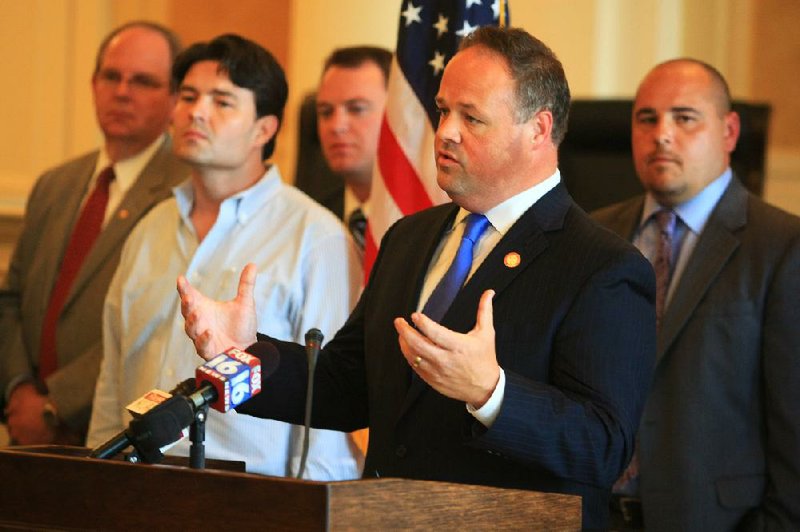LITTLE ROCK — In his 2010 campaign, Lt. Gov. Mark Darr pledged to challenge the constitutionality of the federal health-care law, and he said Thursday that the U.S. Supreme Court ruling upholding the law’s constitutionality is not a loss but “a wake-up call.”
“It shows that political decisions must be made not by courts, but by legislators and executives,” the Springdale Republican said at a news conference at the state Capitol with several Republican state lawmakers around him.
Darr last year signed a brief urging a federal appeals court to resolve a constitutional challenge to the law. The high court’s ruling “shows that I was right” in objecting to the idea that the law’s requirement that everyone buy insurance could be done under the commerce clause of the U.S. Constitution. The Supreme Court said that’s not allowed.
“However, most of us never dreamed that the Supreme Court would interpret Congress’ power to tax in such a broad and unprecedented way,” he said.
State Senate Republican Whip Michael Lamoureux of Russellville called the ruling “definitely a legal defeat” for his view.
Gov. Mike Beebe said he will study the ruling and decide whether the state should implement the Medicaid expansion the law calls for. The Supreme Court ruled that states will not lose all federal Medicaid funding if they choose not to implement that part of the law.
“In the meantime, our separate initiative to create cost savings and improve health care in Arkansas continues,” he said.
Darr said “the advocates of Obamacare believe they prevailed [Thursday]” but “the fight over this issue has only begun.”
The people’s will will be made clear in the November election, he said.
If the state expands Medicaid under the provisions of the law, 274,800 people would become eligible for benefits, the Insurance Department has estimated.
State Medicaid Director Andy Allison said it would cost significantly more than $1 billion to add those people, but stressed that the federal government would pay the cost until 2017 when the state would start paying a share, topping out at 10 percent.
Arkansas’ Medicaid program already faces the possibility of a $400 million shortfall in fiscal 2014, an amount that John Selig, director of the Arkansas Department of Human Services, said would not be affected by expanding Medicaid coverage.
Jay Bradford, the state’s insurance commissioner, said he expects Arkansas to expand Medicaid and accept the additional federal funding.
“I don’t think we would pass that up,” he said.
Some lawmakers want to take a closer look.
“That leaves this battle now here in this Capitol and in capitols across all 50 states,” said state Sen. Jeremy Hutchinson, R-Little Rock.
He questioned whether the goals of the act could still be accomplished without most states participating in the Medicaid expansion. And that can provide the avenue for the law’s opponents to try to keep it from going into effect, he said.
“If we can prevent implementation of the act through preventing exchanges or expenditures of millions and millions and hundreds of millions of dollars on Medicaid expansion, I think you’ll find those of us who are adamantly opposed to the act doing everything we can to stop it,” he said.
Hutchinson said he expects the Medicaid expansion to be a top issue in the coming general election.
“No longer can Arkansas lawmakers say, ‘It’s a federal issue, I don’t have any opinion on it - go ask your congressman about that,’” he said. “Now it’s in your lap.”
House Speaker-designate Darrin Williams, D-Little Rock, said he wants more details about what expanding Medicaid would cost.
“We want to provide coverage that’s good for the state of Arkansas, but we want to be able to pay for it,” he said.
The Patient Protection and Affordable Care Act requires that every state to set up an online marketplace where people can compare and purchase insurance plans by 2014. These are called exchanges. The federal government will run exchanges for states that opt not to create their own.
How much work the state should have been doing to set up the exchange before the Supreme Court ruling has been a contentious topic, with Bradford arguing that the state needed to get moving if it wanted to maintain any control, and Republican lawmakers saying there was no hurry. During the 2011 session, lawmakers defeated a bill that would have authorized the Insurance Department to start working on a state-run exchange.
Instead, in December, Beebe authorized the state to apply for a partnership exchange with the federal government. In April, the Legislative Council gave the department the go-ahead to start spending a $7.7 million federal grant and planning the exchange, over the objections of some Republican lawmakers who said it would be better to wait for the Supreme Court to weigh in.
Bradford said the court’s decision to uphold the mandate that every individual purchase health insurance is the key to making the exchange work because it makes sure that healthy people, whose insurance premiums likely outweigh their health expenditures, will also have to turn to the exchange for coverage.
“If there wasn’t a mandate where people had to participate, you were just going to get sick people in the exchange and that is not a good economic model,” he said. “It wouldn’t have worked from a balance-sheet approach.” Information for this article was contributed by Sarah D. Wire of the Arkansas Democrat-Gazette.
Front Section, Pages 9 on 06/29/2012

